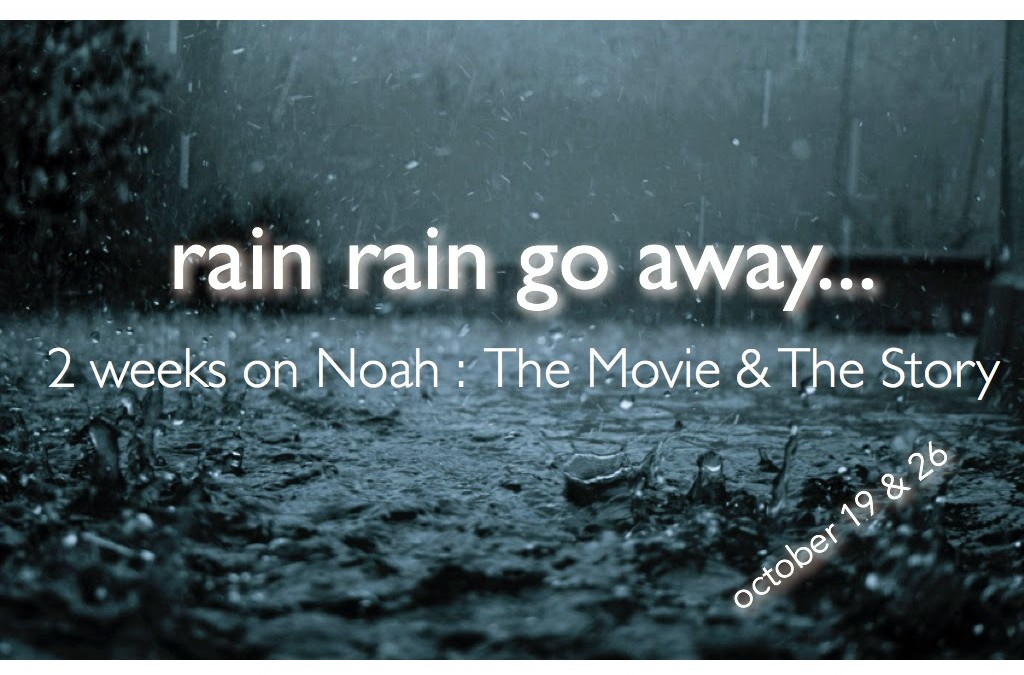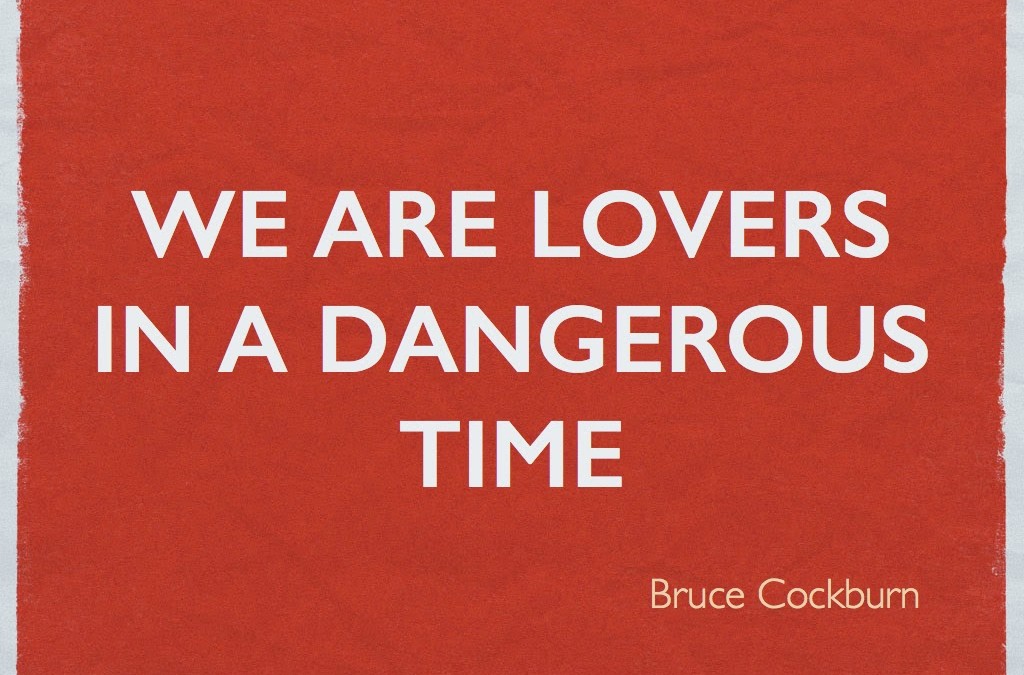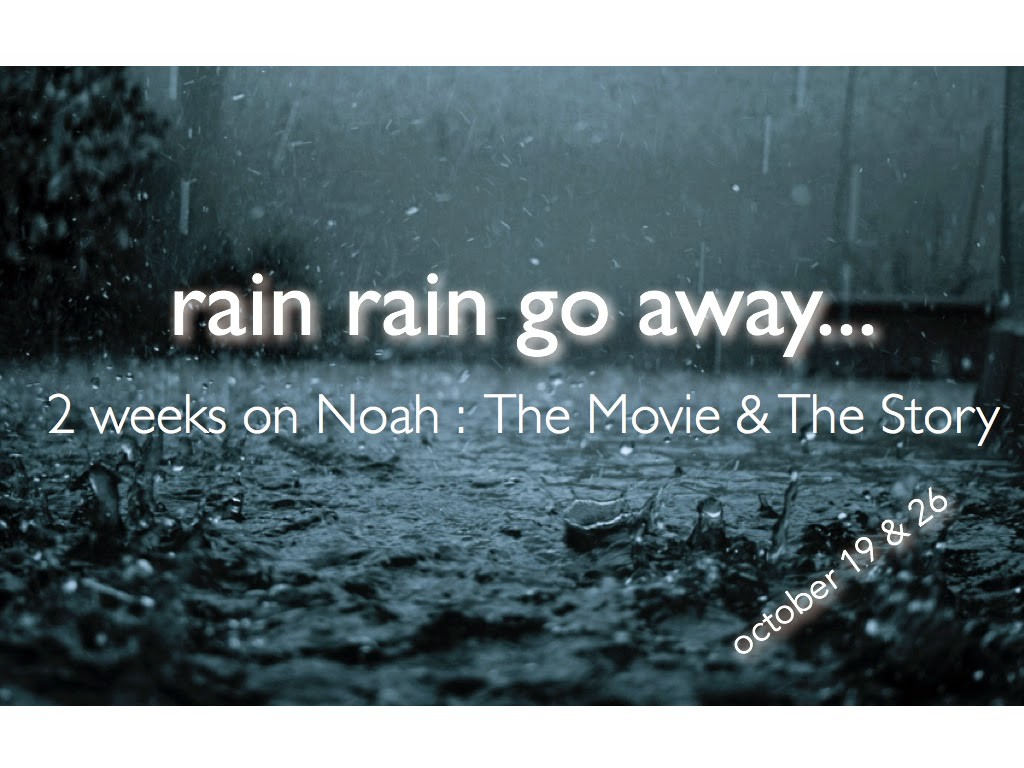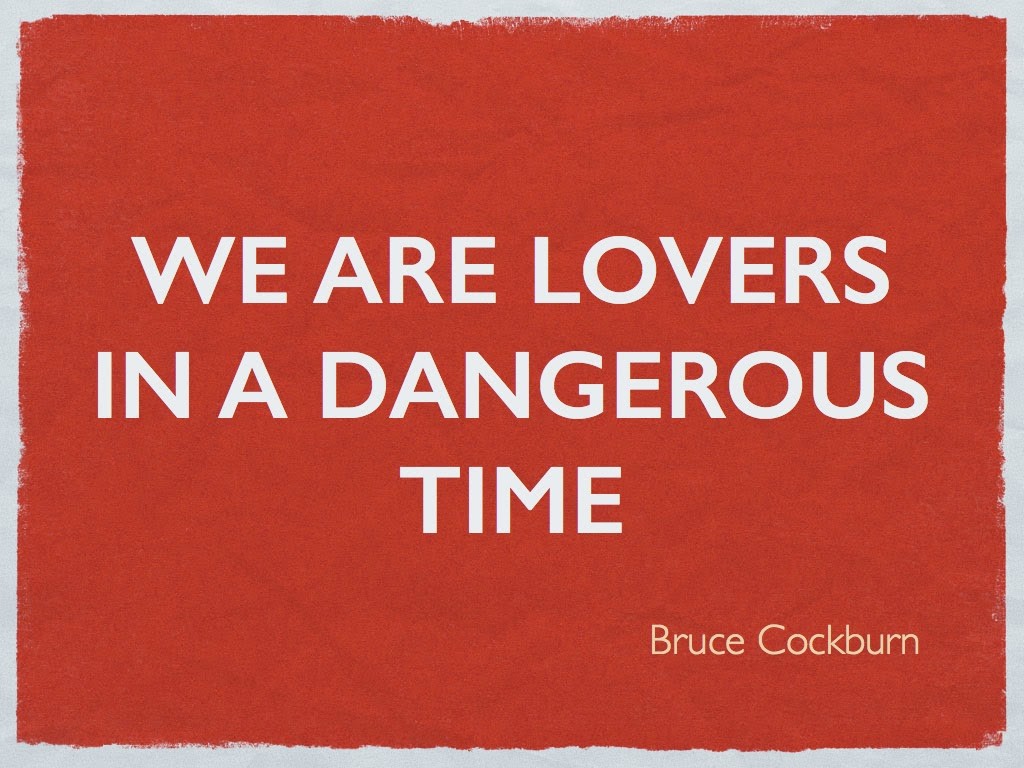by Jonathan Manafo | Oct 29, 2014 | Sunday Conversations
I think in all of us there is some kind of desire, small or larger, to make the world better. However, when things take longer, when budgets are blown, when it gets harder than we originally thought, many people pack it in. We like the idea of doing the extraordinary, but it’s never as easy as it looks in the movies…or in the Bible for that matter.
The story of Noah is epic. Many who don’t know or have read the bible have still heard of it. It seems like every few years a movie is made about it. We talked about the most recent film on this blog last week. In 2007, Steve Carell and Morgan Freeman stared in a Noah (inspired) movie: Evan Almighty was a comedic take on the story. Of course it wasn’t interpreted well and missed much of the true meaning, but it was hilarious.
We’d have to spend a few weeks (posts) on this story to really do it justice. There is a lot we can talk about: history, science, judgement, etc. For today’s purpose, let’s focus on this one idea: Noah was asked to follow and execute God’s plan to restart the world. God pressed the reset button with humanity and Noah was the project manager. Simply saying yes to that had to be a daunting decision. Because we don’t see this dialogue between Noah and God in the Genesis story may be the reason why so many story tellers take liberty to read between the lines. You can here/see some of those here (bill cosby) and here (evan almighty).
One thing we know for sure, God asked Noah to help him make the world better, and Noah said yes. What should we expect when we say yes to God? When God invites us to dream up a better world with him, are there a few things we can learn from Noah’s story? Glad you asked. Here they are.
When you except God’s invitation to work along side him you should expect…
to Stick Out
Any one who’s done anything adventurous has always risked putting their reputation on the line. If you wanna change your world, expect to look a little silly at times. People won’t understand what you’re trying to do. It’s the nature of the job. We can imagine that Noah’s experience was the same. What were people thinking of him? And he didn’t have to live with this for a week or a month? No, it took months and months for this Ark to be built. By simply taking on this task, Noah was going to stick out. But that’s not the only reason ‘one of these things did not belong’ (excuse the sesame street quote). Noah lived a different life than his other contemporaries. Genesis 6:8,9 and 7:1 say that Noah found favour in God’s eyes…and he walked faithfully with God.
Embrace your life in God. Walk this life in full confidence. Follow God with all your heart. He’s worth sticking out for.
to Work Hard
Anytime you want to make your world better, it’s going to take a lot of hard work. We may not want to hear this, but people who are committed to God’s goodness and mission are the ones ‘stuck’ doing all the work. Think about the statement, “So make yourself an ark” (Genesis 6:14) Hello! That isn’t a small statement. It’s not like God said, go and pick up the garbage at the local park or bring a meal to your neighbour or donate some money to your local children’s shelter – he said, ‘go and make an ark’.
We’re just given dates and some timetables, but we can only imagine the work, stress, pressure, and and energy it took to get this done. Whenever God calls us to do something significant, it’s going to take some work. You up for it?
to be REMEMBERed by God
This story is bookended by covenant. Covenant is a partnership God initiates with people. In the first 12 chapters of Genesis He made a covenant with Adam, with Noah, and with Abraham. For Noah, this point of reference allows him to look back and trust that God is with him – that he won’t forget him. Genesis 8:1 has some of the most beautiful words in the Scripture, “God remembered Noah”. It’s like God was saying, ‘remember that covenant we made? I was serious about it. I won’t forget you.’ Covenant reminds us that we are not in this alone – God is the one who initiates. Changing the world is his idea. In Noah’s case, setting the reset button was God’s idea, and He was always going to see it (them) through. He will do the same for us.
that God is looking for HEART (and faith, trust & obedience)
Noah didn’t apply for this job. God didn’t look at 5 other carpenters before he picked Noah for the gig. God had Noah in mind for one reason only: Noah walked faithfully with God (Genesis 6:9). God looks for character before competency. He looks for heart more than he looks for skills.
If you think this story was literal or not it doesn’t take away from what we can learn from it.
What’s God dreaming up with you?
Are you willing to walk with him to see it done?
Will you set aside your insecurities, if you think you lack skill, and simply follow?
Will you look back on his promises (covenant) for encouragement?
Can you say, ‘God, your will, not mine, be done’?
– – – – – – – – – – – – – – – – – – – – – – – – – – – – – – – – –
small(er) group questions:
Take time to respond to the questions above.
Anything about the word ‘covenant’ that you’d like to address?
What else about the Noah story intrigues, excites, or even concerns you?
Anything about the movie you’d like to bring up?
What’s one thing God is (or may) asking you to do that might be, well, a little different, tough, unexpected? What are you doing or will you do something about it?

by Jonathan Manafo | Oct 21, 2014 | Sunday Conversations
I know, I know, what kind of crazy question is this? This year’s release of Noah is obviously based on, rather, inspired by, the biblical story of Noah. Why ask a silly question like the one you read in the title of this post?
Well, this movie got lots of criticism – from both sides. The religious folks criticized it for not being true to the biblical text found in Genesis, and some of the movie buffs said it was not the director’s (Darren Aronofsky) best stuff. If that’s the case, why are we even talking about this movie? Now not all reviews were bad. Some people, myself included, actually liked the movie. Truth be told, I may have enjoyed Evan Almighty (also inspired by the Genesis story of Noah) more than this version of Noah, but I did get lots out of this movie.
Back to my original question. When I watch movies, any kinds of movies, I look for redemptive themes of hope, grace, love, truth, etc. I enjoy discovering scenes in a film that point us to something bigger and better. We all know that life can be a drag and that, if we keep our heads down, we can caught in a rut pretty fast. Any kind of hint that there is something bigger than me, someone bigger than me, that cares, that loves, that makes me a better version of me, is a welcomed idea. Personally, I am convinced the ‘something bigger’ is God, revealed to us in Jesus. (just thought I’d lay my cards on the table up front)
In Noah, the movie, if they got it wrong or right, there are moments in this film that point us to God. Not just any god, but the God who created of the heavens and the earth. Here are some scenes/quotes for you to think about…
“When I see you, I see the man I once knew, the man I came to help”
This is a Rock person (a watcher) speaking to Noah. Even though these characters are fictional at best, something in this scene is beautiful. The biblical account tells us that Noah found favour in the eyes of the Lord. The Rock people see something in Noah they haven’t seen since Adam – God. Noah’s life reflected the Creator. Noah’s way of living pointed people to God. What’s beautiful in this scene is how a person can remind us or point us towards a God that we all long for. I hope that when people see me they see a reflection of Jesus. How about you?
“Noah, you must trust that he speaks to you in a way that you understand”
This line is from Noah’s grandfather, Methuselah. This is a funny relationship, mainly because Anthony Hopkins plays an interesting character who is obsessed with berries. However, what comes out well is a man’s struggle to understand the voice of God in their life. The biblical account simply says that Noah listened and obeyed. The only crack in the armour might come when Noah gets drunk (and naked), in what seems to be a very strange way to end this biblical account. Many people, if not all people, are intrigued with what it means to communicate with God; to be able to hear his voice; to understand what he is saying and how he calls us to live. This scene encourages one to develop that relationship. I want to be able to hear God’s voice, even if at times it’s a struggle, it’s a struggle worth having.
“My father says there can be no king, the Creator is the King”
This line comes from Ham as a response to Tabul-Cain. Tabul-Cain is the ‘bad guy’ in this movie; a descendant of Cain (Remember him? Adam’s son who killed his brother Abel and was thrown out of the garden?). Tabul-Cain’s world view is evil: he runs the show and God is long gone from here and therefore has no control over him or anybody. When Ham shows no knowledge of who he is, Tabul-Cain says, don’t you know who your king is (referring to himself)? Ham’s understanding of kingship is simple, God is the King. We see this theme in the Old Testament a lot. Israel wants to be like other nations, who have a human king and God is always trying to remind them that he is their king and any human form of kingship will come short. Noah had this right – God is one who leads and the one who Noah follows. Any other form of leadership will always come second to God.
“The wickedness is not just in them – it’s in us”
This may be my favourite part of the movie. Only because Noah shows humility by realizing that humanity (himself included) is broken, and therefore needs God to fix them. It’s so easy to look to others and call out their faults and sins. We often make ourselves feel better by pointing out the wrongs in others. However, Jesus said, don’t point out the spec in your brother’s eye when you have a tree trunk in yours. Noah may take this much too far in the movie (watch it for yourself to understand), but there is a deep truth here – If we don’t accept our brokenness and see it for what it is, we will never fully invite God to fix us and make us whole. He’s the only one who can.
“If you’re a man, you can kill”
“We are men, we decide whether we live or die”
These two lines from Tabul-Cain really set up a humanist kind of worldview. If we understand the world to be absent of God, then we actually think that we are in control of our own destiny. I’m not making a case against free will. One of the most beautiful thing’s God give us is ‘choice’. He doesn’t force us to do anything. However, when we place on our selves, the responsibility of someone else’s life or the ‘full’ control of ours for that matter, we are in over our head. When was the last time any human planned their birth or death day? Except for cases of suicide, which are very unfortunate, never. And what kind of mixed up society thinks that killing another human is a sign of maturity? That said, we watch the news and our current events expose many people like this – but I would say, and I hope you would to, that those people are living out an evilness that is opposite of the ways of Jesus. Real men and women are people of peace, not violence. Real men and women are humbled by the idea of being given an opportunity to live, and making the most of that opportunity until the day they die. Quickly read the beatitudes (Matthew 5) and you’ll see what living really is.
As you can see, this wasn’t a review or a critique. I’ll leave that for the experts. Here’s how we’ll close this out – Noah wasn’t a hit with some evangelicals. Noah made some religious people unhappy. You may have watched it and thought, really, they could’ve done better. However, like we should do everyday that we find ourselves immersed in our culture, look for things that point us upward – that inch us closer to God – that might nudge people in the direction of a God who loves them and wants them close to him. I look for that in as many places as I can find it. My God really is in more places than I think he is, if I open my eyes to it – even in a movie that didn’t get it all right. If nothing else, use this movie as a great conversation starter. You can point out differences from the biblical text if you so choose (and there are many), however, what may be better, is to find the places that lead the conversation towards God. Always with gentleness & respect. For more on that read, Colossians 4.

by Jonathan Manafo | Oct 14, 2014 | Sunday Conversations
It feels like there’s always some kind of voice coming at me at any given minute of every day. Think about this: we watch shows and listen to the news, we scroll our twitter and facebook feeds, we have a variety of friends with a variety of opinions, and we have all the important people in our lives feeding us information. None of these are bad of course. They are what they are. Hopefully, in your case, the people close to you are also voices that encourage, challenge and build you up.
We learn by and are shaped from all the voices in our lives. I think back to by university days and remember the excitement of picking up my assigned books. I would have that initial impression about which book I’d like and which one would be a struggle; which book would have an impact and which book may not. I cherish these books, which you would quickly find out when you see most of them still on the shelves around my office and home.
David, known as King, Prophet and Poet, wrote a number of Psalms, which we read today for inspiration, comfort, a reality check and of course, theology. One of those Psalms is number 19 in the Psalter. It’s a real beauty. One that C.S, Lewis said is the most poetic of all of them, and the best lyrics he’s come across…in the world. An old preacher named Charles Spurgeon said that this psalm was inspired by David’s two favourite books: the book called nature and the book called scripture. From these two books, David formed his theology, his thoughts on God, his worldview. We could say that these were the voices that shaped him.

The first book is non-lyrical. Nature doesn’t need words to speak – creation needs no words to say something. David of course felt and knew this deeply. He allowed the voice of God to shape him through creation. The example he gives in Psalm 19 is none other than the sun. It comes up and goes down, without us making it happen. Everything in our home and in our lives works, moves, functions, because in some way we give it fuel; our cars, our furnaces, our lights, our AC, etc. If we don’t work and make money to pay these bills, all those things will cease to work for us. But the Sun…the Sun…it comes up in the morning, warms us all day, and sets at night, and there is nothing we did to make that happen. Not one thing. This is mind blowing for David…and should be for us as well.
I want to allow that voice in my life; the voice of God’s creation; the words from Nature’s book, that God so eloquently wrote, inspire, shape and mould me.
But there is another book David equally appreciates. He would refer to it as God’s law or precepts or commands. We can call this scripture. David knows that this voice from God, not only has words, but it balances the other voice, the other book (nature). He says that he loves these words from God more than the most precious of gold. David, being a King, had access to what other people didn’t have access to, the best gold he could get his hands on. Yet, he would choose God’s words over this gold every time. Think about your most prized possession or your most valuable asset? David would say that God’s voice in his life, through scripture, is more important, more precious to him than that. Would I? Could I?
Here’s the question for us: what voice is narrating our story? What voice are we allowing to shape us most? There are lots to choose from.
In Genesis, after Adam and Eve sinned, an interesting thing happens, they realize that they are naked. Until then, naked was normal. God shows up and asks, “Who told you that you were naked?” It’s like God said, “Who’s voice have you begun to listen to? And when did my voice become secondary?”
Erwin McMannus (The Artisan Soul) says, “what informs us ‘forms’ us…we must decide what voice will define us and what story we choose to be in – which narrative will guide”.
Psalm 19 is a reminder that David, an honourable King, yet an ordinary man, chose to let God’s voice shape his worldview. He was able to see and hear God in Nature (creation) and in Scripture (words). Together, they were his textbook on discovering God. It’s a good example to follow, with an added New Testament understanding of being part of (a church) community.
Let’s long for God’s voice in the same way, so his words (the audible and non-audible) take precedent and are the ones that shape our lives…today.

by Jonathan Manafo | Oct 8, 2014 | Sunday Conversations
One of the most profound, but possibly arrogant things Jesus ever said is found in John14. Many people, Christian or not, know this mind boggling statement. Much of Christian Theology is based on it. Some people find it affirming and comforting, others may find it arrogant and exclusive. When you really think about it, the statement is off the wall. To think that someone would say such a thing about them self and expect people to believe it. No wonder they wanted to kill him.
The words we’re talking about are found in John 14:6. Jesus says that he is ‘The Way, the Truth and the Life’ and that no one goes to the Father except through him. Those are some lofty words. By this point in Jesus life, he had revealed who he was, God’s Son, God in the flesh. He had said and done things that left people with a choice: he’s either a nut case or a he’s the real deal? CS Lewis said that Jesus was either a lunatic, a liar, a legend or…he was actually Lord.
Jesus words in John 14 can truly stand alone. However, words in scripture never do. By that we mean they are always found in a larger text, and we understand them fully in that text.
John 14 starts with Jesus trying to comfort his disciples. In the previous chapter, Jesus begins to let them in on some important info: he’s on his way out. Jesus lets his closest followers know that his time on earth is coming to an end, and they don’t like it one bit. Actually they are quite confused and want some clarity, mainly, where is Jesus going and how can they get there? This is why the first words of John 14 are, “Don’t let your hearts be troubled”. Jesus is comforting his disciples, he does that by reminding them about a few important things.
Jesus is working for them
“My Father’s house has many rooms; if that were not so, would I have told you that I am going to prepare a place for you?” (John 14:2)
The first piece of info Jesus uses to comfort his disciples is to confirm that he is in fact working for them and has always been planning and plodding to ensure that they would be where he will be. The term ‘Father’s House’ was only used one other time in John’s gospel (ch. 2) and is in reference to the temple, which historically was the place where Heaven & Earth meet. When Jesus says he’s preparing a place, it’s a metaphor for a space that will bring to fruition God’s presence and our world becoming one. It’s a place where our prayer for his Kingdom to come on earth as it is in heaven is realized.
My friends have a cottage that I just think is beautiful. It was tough to navigate how to get there, but once we arrived we saw workmanship that you don’t see in too many cottages. My friend’s Dad is the one who built every part of that cottage. From the log walls to the hand picked wooden branch railings. Every part of that home communicates one big idea, “I love my family and I want this place to represent how much we long spending time together”. That folks is what Jesus is communicating to his disciples.
Jesus is the Way
The disciples needed a little more convincing. It’s almost as if they’re saying, ‘thanks for painting a beautiful picture of your plans for us, but how in the world are we going to find it?’
This is where Jesus famous words come in. He says that all they need to do is look to him, because he is the way…to the Father…and there’s no other way. Remember, these words are to aid Jesus’ purpose at the beginning of John 14. He wants to encourage his disciples and settle their hearts. Giving them direction and destination eases their fears about how in the world they are going to find him once he leaves.
These words from Jesus have been seen as arrogant and confusing. Some have wondered how Jesus could be so exclusive and say that he is the only way to God. I can understand why some would feel this way, however, when you think about it, how many ways do you really think can get you to God. If we think that every way gets you there, then no way will get you there.
And think about this: what are the ‘ways’ Jesus shows us his relationship to the Father’s heart? It’s how he lived, how he treated people, how he died for the world. His ways include…
– washing people’s feet
– treating woman & children with dignity (in an era that treated them inhumanely)
– extending wedding parties with vintage wine
– turning the other cheek and extending peace instead of violence
– weeping for his friends, healing lepers, sharing a drink with sinners
That’s not arrogant or self- serving; it’s the opposite!
If those are Jesus’ ways, then I want that way too – I want his way – I want to follow Jesus.
Jesus is God
What’s very important here is how many times in the gospels Jesus tells us that when we are looking at him we are looking at God. He tells Philip in John 14, “when you see me, you’ve see the Father.” What makes Jesus’ statement about being the way, both more valid and more outrageous is that he actually tells us that he is God. We see God clearly when we look at and look to Jesus.
Paul helps us with this through his words in Colossians 1. “The Son is the image of the invisible God, the first born of all creation. For in him all things were created…He is before all things, and in him all things hold together.”
Jesus is more than a road on a map, he is the map. He’s more than a car on the road, he’s a tour bus that brings us all with him.
Jesus invites them to participate in his mission
The last part of this text might be the most puzzling and yet most exciting. Jesus says that we will do what he did…and even greater. Again, these words are supposed to be comfort to some confused disciples. Comforting words normally include rest and relaxation, instead Jesus invites us to work, to serve, to do the same kind of Kingdom things that he himself did. We see lots of this happening in the first few chapters of Acts.
The beauty of this is that we’re invited on this journey, not alone, but in community. We call that the church.
we are a JESUS community
Let’s look back. Over the last few posts we’ve tried to define what it means to be us, and by us I mean the church community we call The Village. We’ve said that we are a learning community; one who discovers the gospel together. We’ve said that we’re a living community; one that not only hears the words of Jesus, but attempts to actually live them. We’ve said that we’re a loving community; one that loves like Jesus and loves because of Jesus. Lastly, and most importantly, we are a Jesus community. He is at the centre of our faith. If we were to look at our faith like we look through a camera, Jesus would be the focal point and everything else falls into place in the peripheral.
In John 6, some people weren’t so sure if following Jesus was all it was cracked up to be. These people started to walk away from him. As they do, Jesus turns to his disciples and says, ‘how about you, do you want to go too?’ They respond with this, “Lord, where are we going to go, you have the words of eternal life”.
Once Jesus’ words hit us, once the gospel really sinks in, once we realize that Jesus is the way, the truth and the life – we really can’t go anywhere else. He’s ruined us. In a good way. Because we know that through him, we have relationship with God, now and forever.
– – – – – – – – – – – – – – – – – – – – – – – – – – – – – – – – – – – – –
small(er) group questions:
What about Jesus? What words do you use to describe him? What do you think about his profound statement: that he’s the WAY, TRUTH, LIFE?
Why would Jesus’ disciples need comforting? Can we compare our faith experience with theirs? Do we need pats on the back in our faith journey?
If Jesus’ words are true, and he is preparing a place for us, how does that impact me today? How do his plans for my future effect my life in the present? How do you feel Jesus is working ‘for’ you? (John 14:1-3)
Is Jesus outrageous statement in John 14:6 arrogant or loving? Is it hard to believe or a welcomed truth? What do you think?
How do you think his words encouraged the disciples? Do they do the same for us?
How does Colossians 1:15 & John 14 work together?
What could we possibly do that is equal or greater to what Jesus did? (John 14:12)
We are a learning, living and loving community. More than that…the central element…is that we are a JESUS community. Why is this so essential?
(Our learning, living and loving is all based on Jesus and his message.)
(Try going back and re-answering the first question)

by Jonathan Manafo | Oct 1, 2014 | Sunday Conversations
The great philosophers of 60s & 70s once said, “All you need is love”. They also once sang to their significant others these lofty words, “8 days a week, I lo-o-o-o-o-ove you”. Imagine having so much love for someone that 7 days in a week wouldn’t be enough to express your love?
Bruce Cockburn and the Bare Naked Ladies tell us that ‘we are lovers of a dangerous time’. Ain’t that the truth. Our banjo strumming, foot stomping sons of mumford sing these words with their scratchy voices, ‘where you invest your love, you invest your life’.
And Bill Murray’s fake twitter account posted, ‘they say that love is more important than money, but have you ever tried paying your bills with a hug?’
Where are we going with all this?
In our last few posts we’ve been trying unpack who WE ARE…as a church community, as followers of Jesus, as people who are discovering what it means to Love God & Others.
We’ve said that we want/need to be a learning community and a living community. In this third edition we remind ourselves that we are called to be a loving community.
In Colossians, Paul includes a beautiful metaphor around the theme of clothing – what people of God are wearing. We’re challenged to put on kindness, compassion, humility, patience, and so on. These are very closely tied to the fruit of the Spirit we talked about in our last post. Out of all these clothes, Paul says that Love is the overcoat. This overcoat both keeps our wardrobe together and helps the other pieces of clothing shine. Love is the part of the equation we just can’t leave out. NT Wright puts it like this, “It is interesting how all roads lead back to love…the greatest of the virtues, the first fruit of the Spirit – even the pagan moralists note it as the primary thing which sets Christianity apart.”
If there’s one thing that defines the Christian Faith, it’s love. One thing sets apart the follower of Jesus, that’s love. Here’s why…
GOD is LOVE
Often times we look for some kind of love or higher energy in all the wrong places. We think only teenagers have this issue, but adults are human beings who long for something bigger and better in their lives. If we just look for love, we may or may not find God, but if we look to God, we will definitely find Love.
In 1 John 4 we read words like, “love comes from God…God showed his love among us…love is God sending his son to us…we know and rely on the love God has for us…GOD IS LOVE.”
Notice the writer doesn’t say this the other way around, that love is God. Instead he insists that God is Love!
We don’t want to get stuck on a flicker of love, when we can have it all in God, through Jesus.
we LOVE one another
As we’ve been reading through John 15 and 1 John 4, I hope we can see that the purpose for this love is two-fold: that we know God’s love and that we can in turn love one another.
“Dear friends, since God so loved us, we also ought to love one another…anyone who loves God must love their sister or brother.” (1 John 4)
“I’m giving you these commands so that you may love one another.” (John 15)
Love is the ultimate evidence that you are a follower of Jesus. And this love starts where you are – with the people closest to you. The NT expresses how much the early followers of Jesus loved one another. Before we get skeptical and wonder why the love is being focused inward (more to come), let’s appreciate that if we can’t love those who are closest to us (i.e. our family, our church community) then we’ll have a much harder time loving those outside our intimate circles.
That said, we know that Jesus doesn’t stop there. God’s love is too big to put a lid on it.
we LOVE the unlovable
What distinguishes us as followers of Jesus is…
– Not (just) that we love our family or those in our church community
– Not (just) that we love those who treat us well
– Not (just) that we love those who bless us
– Not (just) that we love those who look good, smell good and love us back
It’s our love for the unlovable that will set us apart.
Jesus says (Matthew 5), “Love your enemies and pray for those who persecute you, that you may be children of your Father in Heaven…if you love those who love you, what reward will you get? Are not even tax collectors doing that?”
What really defines us is our love for the unlovable, the outcast, the poor, the hurting, the ones who are ‘different’. That’s what makes the difference.
We’ve been asking this question a lot lately, ‘What do we want to be known for?’ I hope in the end it’s for this one thing – How we love, who we love, and under what circumstances we love.
Jesus said, “by this everyone will know that you are my disciples, if you love one another” (John 13:35)
“Where you invest your love, you invest your life” (Mumford and Sons)
– – – – – – – – – – – – – – – – – – – – – – – – – – – –
(small group questions)
We know that love is beautiful. But it is often described as dangerous, risky and unpredictable. Why?
What comes to mind after reading this quote, ““It is interesting how all roads lead back to love…the greatest of the virtues, the first fruit of the Spirit – it is noted as the primary thing which sets Christianity apart.”
(helpful text: Colossians 3:14)
In 1 John 4 we read words like, “love comes from God…God showed his love among us…love is God sending his son to us…we know and rely on the love God has for us…GOD IS LOVE.”
– Why is it important to affirm that God is love, and not (simply) that love is God? Is there a difference?
Jesus leaves us a few ‘nonnegotiables’. Loving one another is one of them. According to this…
“Dear friends, since God so loved us, we also ought to love one another…anyone who loves God must love their sister or brother.” (1 John 4)
…what is our love based out of…what inspires and compels it?
For some it’s easier to love the people we don’t know – the ones who we go out of our way to serve – why? Who should get our first fruits of love?
Loving the unlovable is what defines a follower of Jesus. How do Jesus words in Matthew 5 make you feel? “Love your enemies and pray for those who persecute you, that you may be children of your Father in Heaven…if you love those who love you, what reward will you get? Are not even tax collectors doing that?”
How are Jesus’ and M&S’s words the same?
“by this everyone will know that you are my disciples, if you love one another” (John 13)
“Where you invest your love, you invest your life” (Mumford & Sons)











